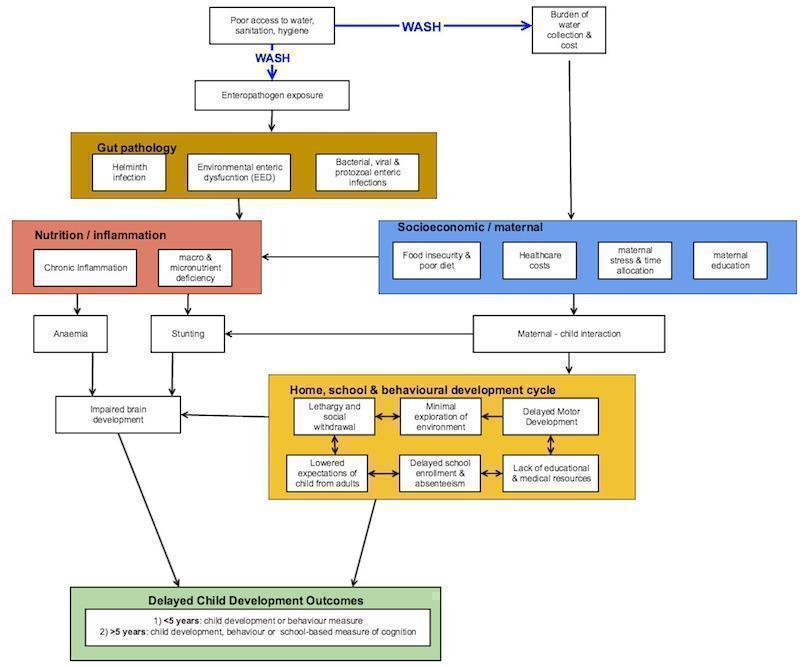Water, sanitation and hygiene (WASH) interventions: effects on child development in low‐ and middle‐income countries
Información
- DOI:
- https://doi.org/10.1002/14651858.CD012613Copiar DOI
- Base de datos:
-
- Cochrane Database of Systematic Reviews
- Versión publicada:
-
- 30 marzo 2017see what's new
- Tipo:
-
- Intervention
- Etapa:
-
- Protocol
- Grupo Editorial Cochrane:
-
Grupo Cochrane de Salud pública
- Copyright:
-
- Copyright © 2017 The Cochrane Collaboration. Published by John Wiley & Sons, Ltd.
Cifras del artículo
Altmetric:
Citado por:
Autores
Contributions of authors
The following has been agreed by all authors.
Draft the protocol: all
Develop a search strategy: all
Study selection: JP, JC and OC
Extract data from studies: JP, JC, OC, AJP, MJG, EA
Enter data into RevMan: JP, JC, OC,
Carry out the analysis: JP, JC, MJG, AJP, OC, EA,
Interpret the analysis: JP, JC, MJG, AJP, OC, EA,
Draft the final review: all
Disagreement resolution: OC
Update the review: JP, JC, MJG, AJP, OC
Declarations of interest
JP, JG, AP and MG are investigators on the Sanitation Hygiene Infant Nutrition Efficacy (SHINE) trial. To avoid any conflict of interest, OC will independently assess the SHINE study for inclusion, and if required, will perform any data extraction.
JP: Student investigator on the Sanitation Hygiene Infant Nutrition Efficacy (SHINE) trial. This trial (registered at clinicaltrials.gov as NCT01824940) is investigating the independent and combined effects of improved WASH and/or improved diet on stunting and anaemia in infants, and will include neurocognitive outcomes. It is therefore relevant to the current review.
JC: Student investigator on the Sanitation Hygiene Infant Nutrition Efficacy (SHINE) trial. This trial (registered at clinicaltrials.gov as NCT01824940) is investigating the independent and combined effects of improved WASH and/or improved diet on stunting and anaemia in infants, and will include neurocognitive outcomes. It is therefore relevant to the current review.
AJP: Received Nestle Nutrition Institute funding to travel to a meeting on low birth weight babies, South Africa, April 2014. Funding received from Bill and Melinda Gates Foundation; Swiss Development Corporation; Department for International Development, UK; and Wellcome Trust (093768/Z/10/Z), for the Sanitation Hygiene Infant Nutrition Efficacy (SHINE) trial, on which he is a coinvestigator in Zimbabwe. This trial (registered at clinicaltrials.gov as NCT01824940) is investigating the independent and combined effects of improved WASH and/or improved diet on stunting and anaemia in infants, and will include neurocognitive outcomes. It is therefore relevant to the current review. AJP is funded by the Wellcome Trust (108065/Z/15/Z).
OC: none.
KL: none
EA: none
MJG: Receives some funding from the World Health Organisation, UNICEF, Sight Savers and Autism Speaks for attendance at meetings and consultancy work relating to the assessment of child development and disability in low and middle income settings. She also holds grants from the Sir Halley Stewart Trust, Grand Challenges Saving Brains Canada and the British Academy of Childhood Disability on unrelated work. MJG is a coinvestigator on the SHINE trial (clinicaltrials.gov identifier NCT01824940), which is investigating the independent and combined effects of improved WASH and/or improved diet on stunting and anaemia in infants, and will include neurocognitive outcomes.
Acknowledgements
We acknowledge support for and review of the protocol from Cochrane Public Health, especially Managing Editor, Jodie Doyle.
Version history
| Published | Title | Stage | Authors | Version |
| 2017 Mar 30 | Water, sanitation and hygiene (WASH) interventions: effects on child development in low‐ and middle‐income countries | Protocol | Joe D Piper, Jaya Chandna, Elizabeth Allen, Kenneth Linkman, Oliver Cumming, Andrew J. Prendergast, Melissa J Gladstone | |

Conceptual framework showing plausible associations between water, sanitation and hygiene (WASH) interventions and gut pathology, nutrition/inflammation, socioeconomic/maternal, home/school environment domains and delayed child development.
| Quality level | Definition |
| High ++++ | We are very confident that the true effect lies close to that of the estimate of the effect. |
| Moderate +++ | We are moderately confident in the effect estimate: the true effect is likely to be close to the estimate of the effect, but there is a possibility that it is substantially different. |
| Low ++ | Our confidence in the effect estimate is limited: the true effect may be substantially different from the estimate of the effect. |
| Very low + | We have very little confidence in the effect estimate: the true effect is likely to be substantially different from the estimate of effect. |

